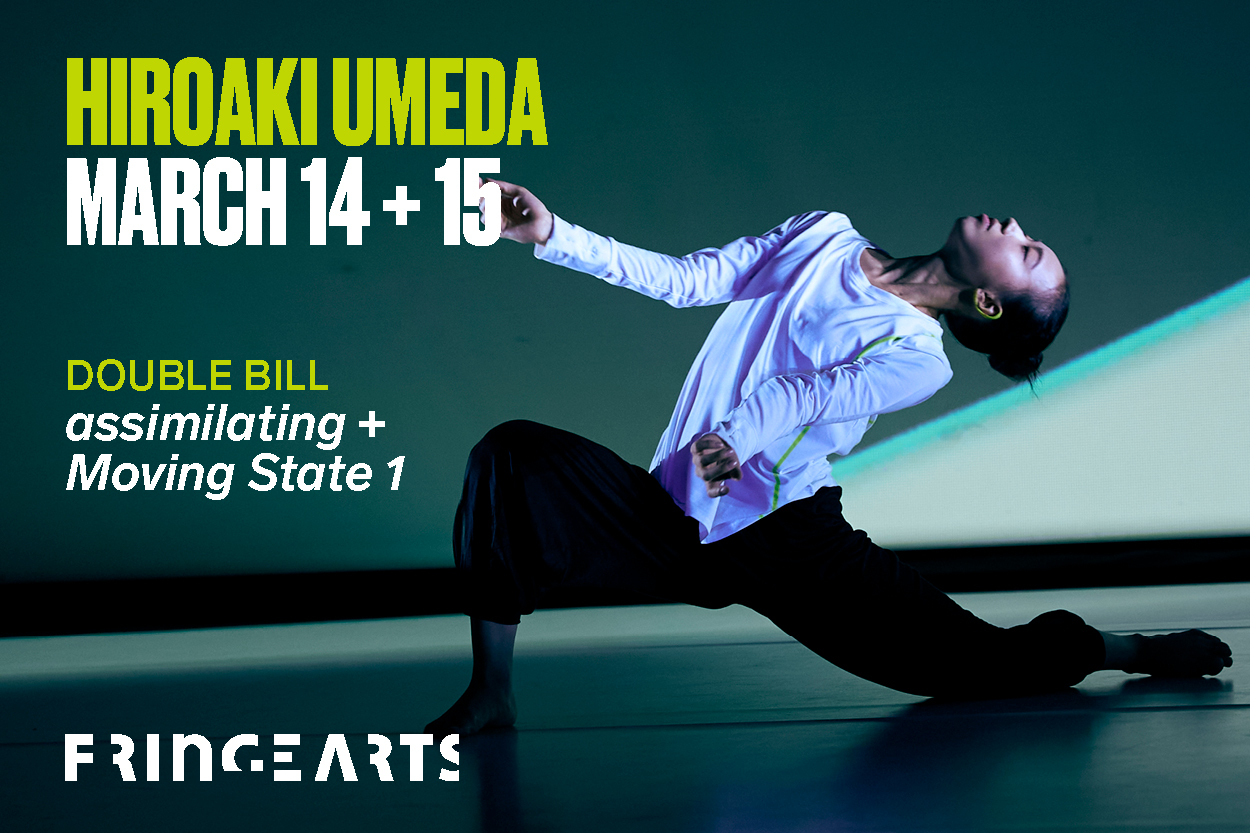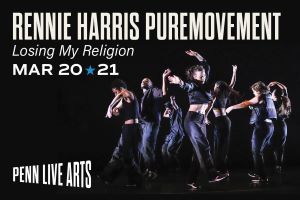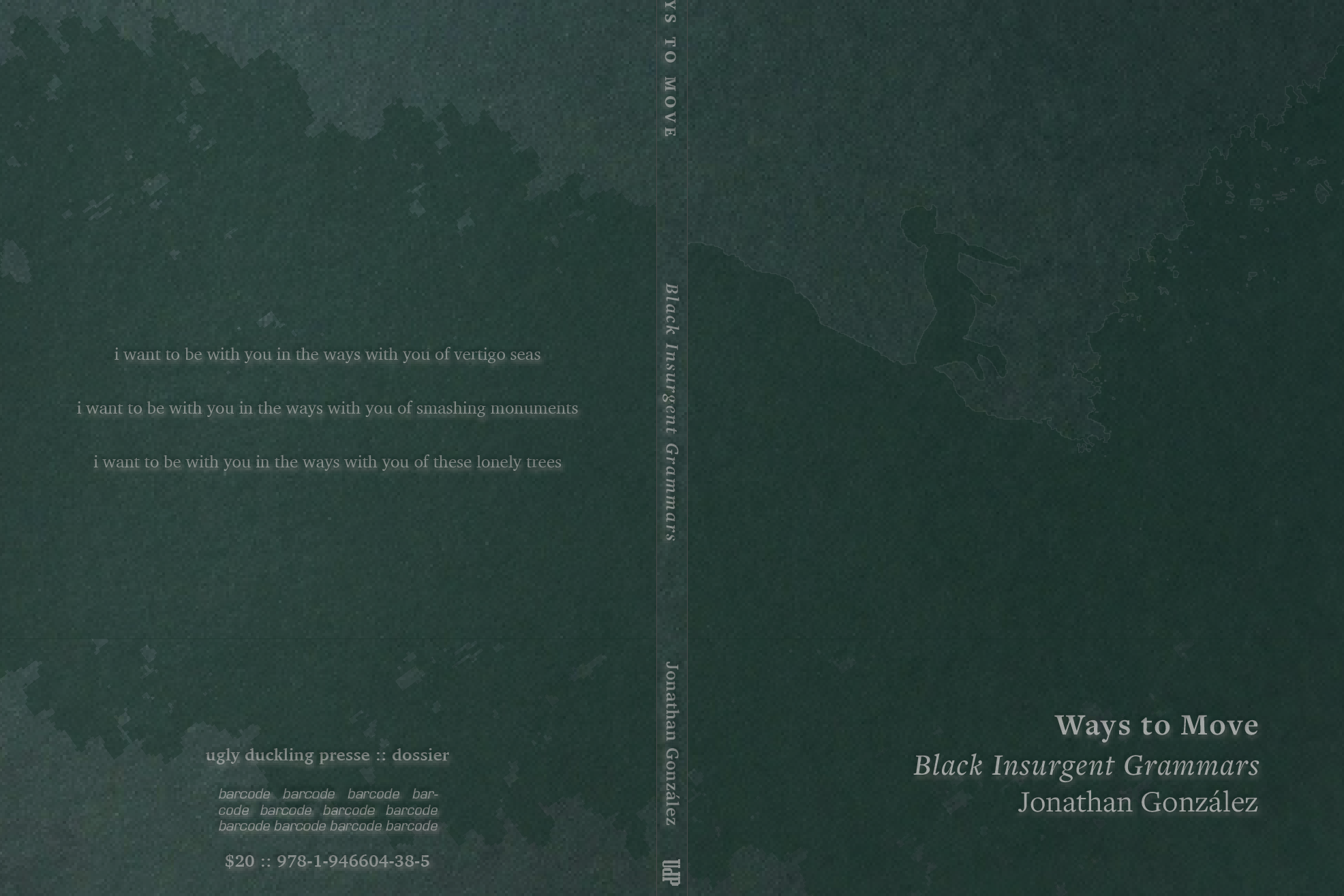Milky Way comes into view softly and from the right; Sarah Peng, seven years old, in a flat cat mask, slinks across the < fidget > space’s stage. The audience’s attention telescopes to quiet, revealing Peng’s already moving hands, delicate and strong, folded in the shape of paws, massaging the marley. She leaps—her limber body hurtles forward, activating billions of deeply stored mirror neurons from billions of hours watching cats—and lands softly on the couch. “Isn’t this so funny! I am a cat but I am not a cat. Tee-hee-hee,” she seems to say. Her commitment, yet lack of self-seriousness, tickles both her and us. For a moment, we revel together in her fictional cat skin—joyous and easy.
Hinako Arao (originally from Hiroshima, Japan) lived in Philadelphia for eight years. She has been in Tokyo for the past two, digesting her life here as an immigrant and why she “couldn’t figure [it] out.” Milky Way, created with a collection of people from around the world, is her response.
Three moments—simple, relatively still, and highly imagistic—stay with me.
1) Arao sitting, eating rice and miso soup with chopsticks. She finishes both bowls. No soundtrack. No other activity. No television. No comment. She eats with ease and balance.
2) Arao and Asaki Kuruma (Yokohama, Japan), two Japanese women, both dressed in red, teeter side-to-side as if on a ship. Finally, they catch each other and embrace. I rest as they do, experiencing one of the only tender physical touches in the piece.
3) Arao and Kuruma sing, karaoke-style and in English, to a straight line of three American performers: Ilse Zoerb (Richland Center, WI), Nathan Clemenson (St. Paul, MN), and Thomas Deis (New Brunswick, NJ). A 19-year-old Japanese woman who grew up in the mountains of Japan wrote the lyrics in a workshop. Arao and Kurumu mouth the words as the soundtrack plays:
White people dancing are so beautiful with their eyes and noses lips and skin
They mesmerize me wherever they go with their long legs they go everywhere
Long white arms hold the world
Oh and it’s a big world but it’s not too big for them
I feel ashamed but I stare
Oh how I admire them but I can’t be like them
Oh white people all I can do is hope to like you white people.
These moments provide brief repose in a composition of constant shifts and awkward halts. Milky Way is a strange, frictionless, and constantly changing world: a girl for a cat, a stool for a dog, panela a reminder of home. A mouthful of water, flowers, or salt becomes a response to a kiss. Clemenson, a white man, presumably stands in for Arao’s Pakistani ex-boyfriend. Milky Way makes these substitutions visible for what they are: substitutes. Initially funny or odd, eventually they gather their own gravity.
Giovany Barerra (Bogota, Columbia) pulls out a CD, coffee, a blanket, and panela from a plastic grocery bag. These things feel removed from an original context, like seashells or trinkets removed to a bedside table. He “tries to speak clearly” in English, swapping his more musical pronunciation of the letter ‘v,’ to a more monotone and sharp ‘v.’ His Spanish rolls easily in his mouth; the contours of English, stranger for him, are more familiar to ‘us.’
The language fault collapses fully for me when Kierstin Lee (Philadelphia, PA) steps forward in a formal purple dress and begins speaking Japanese. Arao’s “Director’s Note” tells me that the text is an argument between a wife and her husband, discussing divorce and whether they should move their son away from Fukushima, where the number of children with thyroid cancer is increasing owing to the pollution that remains from the nuclear power plant accident in 2011. It doesn’t matter how hard I try to catch the nuances of tones and feelings, the meaning of her gestures. I miss most everything.
Individual, punctuated cries—for companionship, for recognition (Zoerb bounces around like a bumble ball, yelling “look at me, look at me!”), for home (Barerra, wrapped in his blanket, “I hate my house”)—all go unanswered here. Arao tells Clemenson, “I think we should go.” He tells her, “I think we should stay.” Needs land nowhere; human cries gain no traction. I’m unsure of what to grab onto. I’m unsure if this is intentional. I feel dislodged.
Kyuhyum Marie Kim (Seoul, South Korea) sings us out with a rendition of Miley Cyrus’s Party in the USA. Kim invites the audience to get up and dance, so I do—offering my long white arms to the space, attempting to celebrate these people’s journeys. Neither the cast nor the audience join. Just outside the < fidget > space, whose curtains tightly close out the Sunday afternoon, multiple other universes rage: Syrian refugees fleeing, black bodies attacked, ISIS, families preparing for Thanksgiving, billions of cat videos. I pass through the exit and step out onto the balcony. The colors of a late autumn sunset in Philadelphia, USA, rise up sharp to meet my gaze.
Milky Way, Hinako Arao, thefidget space, November 20-22






